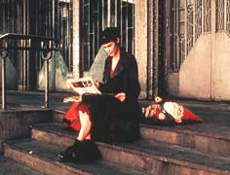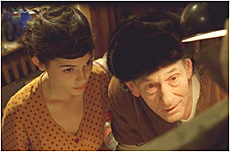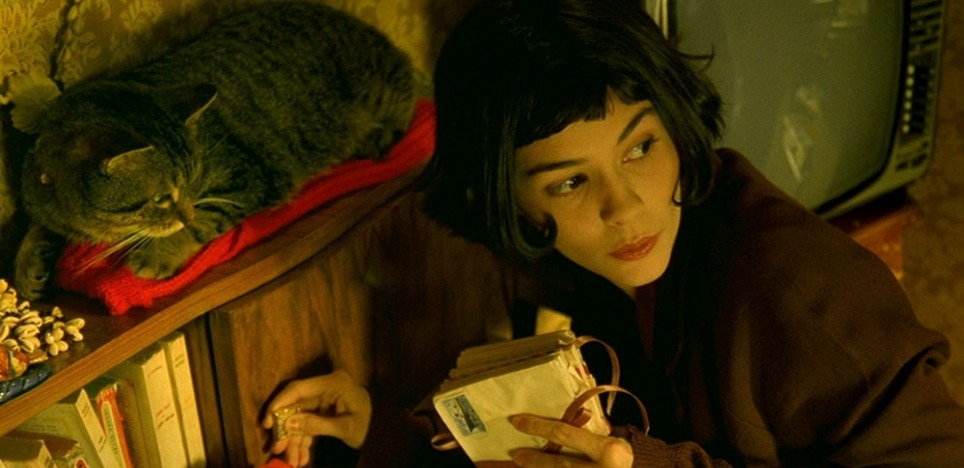The spiritual life, Buddha says, is impossible without a generous heart. And in the Gospel of Luke, Jesus advises his followers "to give and it will be given to you." Wendy Lustbader, a mental health counselor, elaborates on the benefits of generosity: "The words 'genius' and 'generous' come from the Latin root 'genere' meaning 'to beget': to have a genius for life is to possess the ability to generate warmth and well-being in others. Largess literally enlarges our lives."
Amélie, a buoyant French film, has set box-office records in its homeland. This immensely entertaining and cinematically creative film presents an unforgettable portrait of a woman who truly demonstrates a genius for life, thanks to her spiritual practice of kindness. Approach her story in a relaxed and playful state of mind and you will reap the benefits of its many surprises.
Amélie runs 120 minutes and is rated R for sexual content. For our review of the film and a plot synopsis, click here.

1. HELPING OUT
"Helping out is not some special skill. It is not the domain of rare individuals. It is not confined to a single part or time of ourselves. We simply heed the call of that natural caring impulse within and follow where it leads us," Ram Dass and Paul Gorman write in How Can I Help?
- What do you make of the connection between the start of Amélie's campaign to be a good person and the August 31st death of Princess Diana? What character qualities does Amélie possess that make her a good candidate for the spiritual practice of kindness?
- In what ways have you recently expressed the natural caring impulse within you?

2. JOY IN SERVING
"Waiters have taught me to find joy in serving people. Barbers tell me they derive great pleasure from helping people look better and feel better. All are sacred missions," Jeffrey K. Salkin asserts in Being God's Partner.
- Although Amélie is a waitress and shows the pleasure she gets in serving others, her epiphany about the joy of this sacred mission comes after she sees the happiness of the man who's reunited with the tin box containing treasures from his childhood. Talk about the importance of this scene.
- When was the last time you experienced a helper's high — the feeling of well-being that comes when you've done something special for someone else?
3. FIXING THINGS
"Jewish mysticism teaches that God created the world with flaws. The world needs to be fixed and it is fixed through human action. The idea of 'tikkum olam' (repairing the world) makes human beings very important. The state of the world rests on our shoulders," writes David Wolpe in Teaching Your Children About God.
- There are no repairs of the world that are too small or insignificant to be praised. Which of Amélie's many care-taking projects spoke most directly and emotionally to you?
- Share your feelings about the spiritual idea that the state of your community rests on your shoulders.

4. BEING PLAYFUL
"When we play," Lenore Terr concludes in Beyond Love and Work, "we sense no limitations. In fact, when we are playing, we are usually unaware of ourselves. Self-observation goes out the window. We forget all those past lessons of life, forget our potential foolishness, forget ourselves. We immerse ourselves in the act of play. And we become free."
- Amélie's acts of kindness toward her father are revealed in a playful scheme involving his garden gnome. She also becomes a prankster in her escapades in the apartment of the authoritarian and verbally abusive grocer. Share your responses to Amélie's playfulness. What other scenes in the movie reveal her frolicsome spirit?
- How does your playful side manifest itself? Talk about your experiences of the link between play and freedom and service.
5. WORDS OF ENCOURAGEMENT
"One of the most beautiful gifts in the world is the gift of encouragement. When someone encourages you, that person helps you over a threshold you might never have crossed on your own," John O'Donohue states in Eternal Echoes.
- How would you describe the relationship between Amélie and Dufayel, the elderly painter who is her neighbor? In what crucial scenes does he provide encouragement for her? Discuss the importance of the Renoir painting in the film.
- Recall the last time you provided timely encouragement to someone who desperately needed it. Who has been a mentor of encouragement to you?

6. BEAUTY IN UNEXPECTED PLACES
"I know that God loves beauty, for the Almighty allows it to flourish everywhere, even in unexpected places," Ben Zion is quoted as saying in Rabbi Terry Bookman's The Busy Soul.
- Some would say that the shy and slow blooming attraction between Amélie and Nino is a thing of beauty. Do you agree? What other scenes or /uploads/features/images in the film attest to the beauty that flourishes in unexpected places?
- The filmmakers clearly delight in the beauty of the city of Paris. What beauties has your soul found in unexpected places where you live or work
7. ADD A MEASURE OF GRACE TO THE WORLD
In the play The Man of La Mancha, Don Quixote says on his deathbed: "I just wanted to add a measure of grace to the world."
- Like Don Quixote, Amélie tries to add a measure of grace to the world by gladdening the hearts of others, uplifting their spirits, taking away their disappointments and avenging those who have been wronged. And, by the way, the café where she works is called "Two Windmills." Explore this connection or just talk about what you liked best about this movie's celebration of doing good.
- Years ago, James M. Barrie, author of Peter Pan, made a good suggestion: “Shall we make a new rule of life from tonight: Always try to be a little kinder than is necessary.” Talk about what this intention might mean in your daily life.
This guide is one in a series of more than 200 Values & Visions Guides written by Frederic and Mary Ann Brussat. Text copyright 2001 by Frederic and Mary Ann Brussat. Photos courtesy of Miramax Zoë. This guide is posted as a service to visitors to www.SpiritualityandPractice.com. It may not be photocopied, reprinted, or distributed electronically without permission from Frederic and Mary Ann Brussat — except it may be duplicated for use by groups participating in the e-course "Going to the Movies as a Spiritual Practice." For other uses and for a list of guides in the Values & Visions series and ordering information, email your name and mailing address to: brussat@spiritualrx.com.
